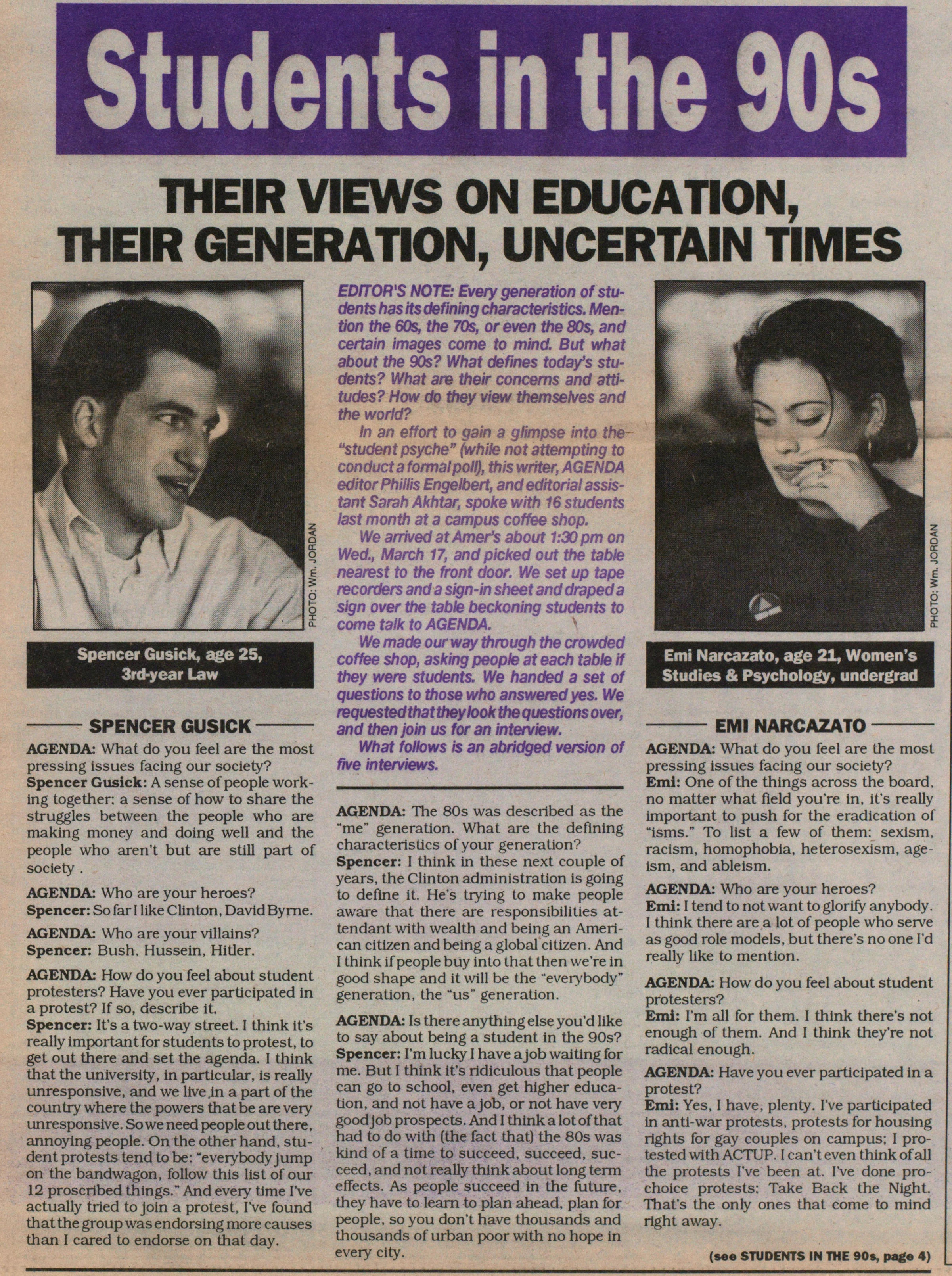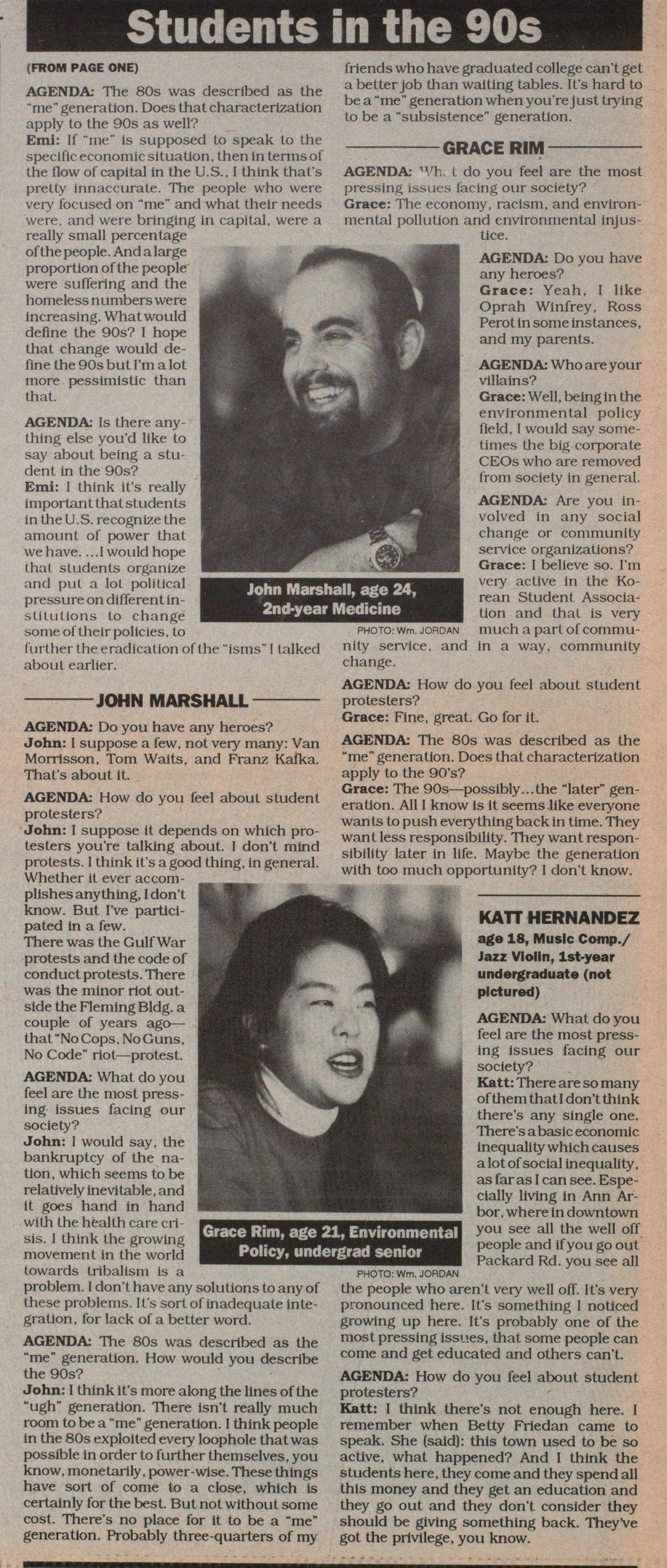Students In The 90s


Editor's Note: Every generation of students has its defining characteristics. mention the 60s, the 70s, or even the 80s, and certain images come to mind. But what about the 90s? What defines today's students? What are their concerns and attitudes? How do they view themselves and the world?
In an effort to gain a glimpse into the "student psyche" (while not attempting to conduct a formal poll), this write, AGENDA editor Phillis Engelbert, and editorial assistant Sarah Akhtar, spoke with 16 students last month at a campus coffee shop.
We arrived at Amer's about 1:30 pm on Wed., March 17 and picked out the table nearest to the front door. We set up tape recorders and a sign-in sheet and draped a sign over the table beckoning students to come talk to AGENDA.
We made our way through the crowded coffee shop, asking people at each table if they were students. We handed a set of questions to those who answered yes. We requested that they look the questions over, and then join us for an interview.
What follows is an abridged version of five interviews.
Spencer Gusick
AGENDA: What do you feel are the most pressing issues facing our society?
Spencer Gusick: A sense of people working together: a sense of how to share the struggles between the people who are making money and doing well and the people who aren't but are still part of society .
AGENDA: Who are your heroes?
Spencer: So far I like Clinton, David Byrne.
AGENDA: Who are your vlllains? S
pencer: Bush, Hussein, Hitler.
AGENDA: How do you feel about student protesters? Have you ever participated in a protest? If so, describe it.
Spencer: It's a two-way street. I think it's really important for students to protest, to get out there and set the agenda. I think that the university, in particular, is really unresponsive, and we live, in a part of the country where the powers that be are very unresponsive. So we need people out there , annoying people. On the other hand, student protests tend to be: "everybody jump on the bandwagon, follow this list of our 12 proscribed things." And every time I've actually tried to Join a protest, I've found that the group was endorsing more causes than I cared to endorse on that day.
AGENDA: The 80s was described as the "me" generation. What are the defining characteristlcs of your generation?
Spencer: I think in these next couple of years, the Clinton administration is going to define it. He's trying to make people aware that there are responsibilities attendant with vvealth and being an American citizen and being a global c i tizen. And I think if people buy into that then we're in good shape and it will be the "everybody" generation, the "us" generation.
AGENDA: Is there any thing else you'd like to say about being a student in the 90s?
Spencer: I'm lucky I have ajob waltlng for me. But I think it's ridiculous that people can go to school, even get higher education, and not have ajob, or not have very good Job prospecte. And I think a lot of that had to do with (the fact that) the 80s was kind of a time to succeed, succeed, succeed, and not really think about long term effects. As people succeed in the future, they have to learn to plan ahead, plan for people, so y ou don't have thousands and thousands of urban poor with no hope in every city.
EMI NARCAZATO
AGENDA: What do you feel are the most pressing issues facing our society?
Emi: One of the things across the board, no matter what field you're in, it's really important to push for the eradication of "isms." To list a few of them: sexism, racism, homophobia, heterosexism, ageism, and ableism.
AGENDA: Who are your heroes?
Emi: I tend to not want to glorify anybody. I think there are a lot of people who serve as good role models, but there's no one I'd really like to mention.
AGENDA: How do you feel about student protesters?
Emi: I'm all for them. I think there's not enough of them. And I think they're not radical enough.
AGENDA: Have you ever participated in a protest?
Emi: Yes, I have, plenty. I've participated in anti-war protests, protests for housing rights for gay couples on campus; I protested with ACTUP. I can't even think of all the protests I've been at. I've done prochoice protests: Take Back the Night. That's the only ones that come to mind right away.
(see STUDENTS IN THE 90s, page 4)
(FROM PAGE ONE) AGENDA: The 80s was described as the "me" generation. Does that characterization apply to the 90s as well?
Emi: If "me" is supposed to speak to the specific economic situation, then in terms of the flow of capital in the U.S., I think that's pretty inaccurate. The people who were very focused on "me" and what their needs were, and were bringing in capital, were a really small percentage of the people. And a large proportion of the people were suffering and the homeless numbers were increasing. What would define the 90s? I hope that change would define the 90s but I'm a lot more pessimistic than that.
AGENDA: Is there anything else you'd like to say about being a student In the 90s?
Emi: I think it's really important that students in the U.S. recognize the amount of power that we have. ... I would hope that students organize and put a lol political pressure on different institutions to change some of their policies, to further the eradication of the "isms" I talked about earlier.
JOHN MARSHALL
AGENDA: Do you have any heroes?
John: I suppose a few, not very many: Van Morrisson, Torn Walts, and Franz Kafka. That's about it.
AGENDA: How do you feel about student protesters?
John: I suppose it depends on which protesters you're talking about. I don't mind protests. I think it's a good thing, in general. Whether it ever accomplishes anything, I don't know. But I've participated In a few. There was the Gulf War protests and the code of conduct protests. There was the minor riot outside the Fleming Bldg. a couple of years ago - that NoCops, NoGuns, No Code" riot - protest.
AGENDA: What do you feel are the most pressing issues facing our society?
John: I would say, the bankruptcy of the nation, which seems to be relatively inevitable, and it goes hand in hand with the health care crisis. I think the growing movement in the world towards tribalism is a problem. I don't have any solutions to any of these problems. U's sort of inadequate integration, for lack of a better word.
AGENDA: The 80s was described as the "me" generation. How would you describe the 90s?
John: I think it's more along the lines of the "ugh" generation. There isn't really much room to be a "me" generation. I think people In the 80s exploited every loophole that was possible in order to further themselves, you know, monetarily , power-wise. These things have sort of come to a close, which is certainly for the best. But not without some cost. There's no place for it to be a "me" generation. Probably three-quarters of my friends who have graduated college can't get a better job than waiting tables. It's hard to be a "me" generation when you're just trying to be a "subsistence" generation.
GRACE RIM
AGENDA: What do you feel are the most pressing issues facing our society?
Grace: The economy, racism, and environmental pollution and environmental injustice.
AGENDA: Do you have any heroes?
Grace: Yeah, I like Oprah Winfrey, Ross Perot in some instances and my parents.
AGENDA: Who are your villains?
Grace: Well, being in the environmental policy field, I would say sometimes the big corporate CEOs who are removed from society in general.
AGENDA: Are you involved in any social change or community service organizations?
Grace: I believe so. I'm very active in the Korean Student Association and that is very much a part of community service, and in a way, community change.
AGENDA: How do you feel about student protesters?
Grace: Fine, great. Go for it.
AGENDA: The 80s was described as the "me" generation. Does that characterization apply to the 90's?
Grace: The 90s - possibly...the "later" generation. All I know is it seems.like everyone wants to push every thing back in time. They want less responsibility. They want responsibility later in life. Maybe the generation with too much opportunity? I don't know.
KATT HERNANDEZ age 18, Music Comp. Jazz Violin, 1st-year undergraduate (not pictured)
AGENDA: What do you feel are the most pressing issues facing our society?
Katt: There are so many of them that I don't think there's any single one. There 's a basic economic inequality which causes a lot of social inequality, as far as I can see. Especially living in Ann Arbor, where in downtown you see all the well off people and if you go out Packard Rd. you see all the people who aren't very well off. It's very pronounced here. It's something I noticed growing up here. It's probably one of the most pressing issues, that some people can come and get educated and others can't.
AGENDA: How do you feel about student protesters?
Katt: I think there's not enough here. I remember when Betty Friedan came to speak. She (said): this town used to be so active, what happened? And I think the students here, they come and they spend all this money and they get an education and they go out and they don't consider they should be giving something back. They've got the privilege, you know.